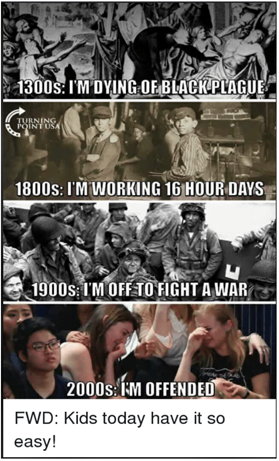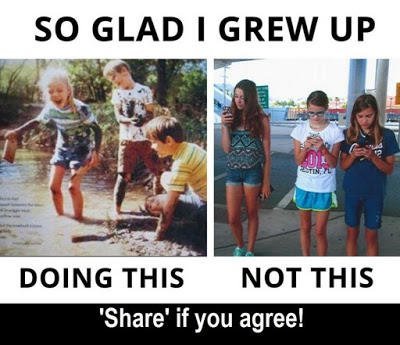Sewage pipes can be fun! There’s one a few minutes’ walk from my childhood home which spans across a small valley. In the centre it looms about 40 feet (12 metres) above the river which runs below. Back in the late 80s the young me and my fearless friends used to clamber past the safety barrier and walk across it. Even in the rain. Sometimes we would spin around theatrically at the high point. The more bravado the better. The older and moderately wiser me now looks back with a mixture of nostalgia and bemusement at our stupidity.
With some notable assistance, I’ve managed to produce three children of my own since then. None of them have ‘walked the piperope’ like I did, but I’m happy to report that my first two made it to adulthood relatively unscathed, and I have high hopes for the third. It seems however that there’s a sentiment from sections of the generation above me (and some of my generation too) that we’ve overstepped the mark somewhere in our protective parenting, and our children are lesser for it. The general accusation is that mollycoddling parents and certain societal changes have produced generations of lazy, disrespectful, over-sensitive children with a badly inflated sense of entitlement and self-importance. These accusations may crop up during awkward conversations with elderly relatives, but they are much more prevalent in the form of clickbait tabloid articles and social media snipery.
“They have trouble making decisions. They would rather hike in the Himalayas than climb a corporate ladder. They have few heroes, no anthems, no style to call their own. They crave entertainment, but their attention span is as short as one zap of a TV dial.”
Proceeding with Caution, Time, 2001
Regression to the meme
The idea that kids these days have somehow lost their way isn’t a new one, but the internet certainly makes it easier to fire off shots into the echo-chamber, as this frequently shared meme shows:

Many who have shared this will not even have noticed the watermark of right wing organisation Turning Point USA on the image. Considering that Turning Point USA is a right-wing organization which has effectively acted as an on-ramp for white supremacists, even those who found this meme lighthearted have to concede it has a more sinister undertone. Others will no doubt be well aware of this, and will be delighted to perpetuate their myth of the ‘good old days’ as part of a larger mission to Make Everything Great Again.
“What really distinguishes this generation from those before it is that it’s the first generation in American history to live so well and complain so bitterly about it.”
The Boring Twenties, Washington Post, 1993
Old-rage pensioners
There are of course plenty of other memes with benign sources that sustain similar strawman-style sentiment towards the younger generations, but are we simply being made aware of the bitterness of a vocal minority due to adverse algorithms, or does this genuinely reflect the prevailing sentiment? The answer is that it’s hard to tell: a 2017 Scottish Government Survey of public attitudes to young people was a mixed bag, but showed generally positive attitudes towards young people. However, going back a little further to 2011, the Intergenerational Foundation’s survey painted a different picture, with older generations viewing their youngers as unfriendly, incompetent and having low moral standards. It also showed a distinct difference in perception of British youth compared to their counterparts in 28 other European Countries. So, there’s clearly something going on, and it may well be worse here in the UK than elsewhere across the continent.
“…in youth clubs were young people who would not take part in boxing, wrestling or similar exercises which did not appeal to them. The ‘tough guy’ of the films made some appeal but when it came to something that led to physical strain or risk they would not take it.”
YOUNG PEOPLE WHO SPEND TOO MUCH, DUNDEE EVENING TELEGRAPH, 1945
Offence post
The idea that young people are ‘snowflakes’ who get offended at the drop of a hat is a pervasive trope in sections of society, and doubtlessly feeds into the negative judgements of their elders. But, do young people really get offended too easily these days? Well, that’s subjective to say the least. It’s certainly easier to make your disapproval public thanks to the internet. It’s not unrealistic to think that the youth of yesteryear may have been more socially aware and vocal if there had been easier means to do so, and a world of information (and misinformation) at their fingertips. Add to this the fact that the social attitudes of young people, according to a 2014 survey, “continue the gradual shift towards increasingly liberal/permissive social attitudes about gender equality, sexuality, race and ethnicity”. It could therefore be argued that it’s less about how easily they’re offended, and more about what offends them that could be troubling to segments of the older generation.
That picture is blurred by a number of factors: The stories we hear in the papers and on social media tend to be the more extreme and occasionally ridiculous examples, a phenomenon which has been somewhat unpleasantly named ‘nutpicking’. Certain tabloids are also desperate to play the ‘snowflake’ card at every opportunity as well, exemplified by The Sun’s approach to criticism of popular 90s sitcom Friends, which turned into an indulgent festival of millienial-bashing
“We defy anyone who goes about with his eyes open to deny that there is, as never before, an attitude on the part of young folk which is best described as grossly thoughtless, rude, and utterly selfish.”
The Conduct of Young People, Hull Daily Mail, 1925
Snow-fakes!
Looking behind the curtain though, this type of millennial mauling could be seen as some kind of coping mechanism for people my age (47) and older who grew up in a time plagued by some highly questionable social attitudes, who don’t relish the thought that they might have said and done things they’re no longer proud of. As I look back at some of the entertainment I enjoyed and values I held in the past it makes me uncomfortable to say the least. In many ways I’m ashamed of the younger me. It must be much easier to push back on that feeling and direct the blame outwards. It’s classic school bully behaviour. Honest introspection is rarely enjoyable, and the mild irritation of cognitive dissonance offers a path of lower resistance.
The caricature of millennial fragility is particularly frustrating, because being in touch with your emotions and expressing them honestly and openly in public is not something to be frowned upon. For a simple illustration of this why not Google the name of the tabloid of your choice along with terms like male stigma mental health: You’ll no doubts find reams of articles encouraging openness, communication, self-expression, and being in touch with your emotions. Why is it then that those very same publications will vilify the younger generation for espousing those values? It’s hard to see their occasional tips of the hat towards mental health as anything other than examples of the “virtue signalling” they so frequently criticise.
“The world is passing through troublous times. The young people of today think of nothing but themselves. They have no reverence for parents or old age. They are impatient of all restraint. They talk as if they knew everything, and what passes for wisdom with us is foolishness with them. As for the girls, they are forward, immodest and unladylike in speech, behavior and dress.”
From a sermon preached by Peter the Hermit in A.D. 1274
Youth clubbed
There are of course valid concerns, which merit some attention. In terms of laziness, childhood obesity continues to be a problem, but then again so is adult obesity. With poor diet and low levels of physical activity the primary cited as the primary causal factors, it’s easier to blame turkey twizzlers and mobile phones than it is to blame poverty and the continuous closure of playparks and youth centres.

The increased use of mobile phones and screentime are symptomatic of larger changes going on in society. Perhaps one of the few silver linings of the covid-19 crisis is that people of all ages have learned that living a sizeable portion of your life online can be rewarding and fulfilling, particularly when face to face contact isn’t really an option. Personally speaking I’d rather exchange messages with my internet buddies across the world than have a chat over the garden fence with my nice but somewhat dull neighbours (don’t worry, they won’t be reading this – and even if they do I’ll say it’s the folks on the other side).
“[Young people] are high-minded because they have not yet been humbled by life, nor have they experienced the force of circumstances. They think they know everything, and are always quite sure about it.”
Attributed to Aristotle, 4th Century BC
No kidding
I miss a lot of things about being young; innocence, energy, my hair, and a lack of lower back pain to name but a few. Nostalgia is fun in small doses, and so is vicariously reliving some of the fun parts of growing up through my children. But there’s a darker side to that: A horde of new challenges out there that have to be dealt with, like global warming, zero-hour contracts, tuition fees, cyber bullying, and the lack of affordable houses. Add those to the challenges that were already there, and suddenly an opportunity to be young again doesn’t look so enticing. With all that in mind, it’s strange that some people can look at the youth of today and be so certain that they’re doing it all wrong.



